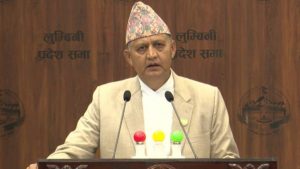
Government Expenditure and Infrastructure Development

Concern over government expenditure is a hallmark of responsible citizenship, as it directly impacts a nation’s progress. The allocation and utilization of funds in a fiscal year reveal critical insights into national priorities and development trajectories.
In the current fiscal year, Nepal’s budget allocation stood at Rs 1,751.31 billion, with significant portions earmarked for various expenditures. Notably, 65% of the budget, amounting to Rs 1,141.78 billion, is allocated for current expenditures, addressing administrative and operational needs. Financial management receives 18% (Rs 307.45 billion), while capital expenditure, crucial for infrastructure development, receives 17% (Rs 302.07 billion).
Capital expenditure plays a pivotal role in infrastructure growth, encompassing vital projects like roads, bridges, hospitals, and educational institutions. However, despite its critical importance, the allocated budget for capital expenditure often faces challenges. A considerable portion of these funds remains underutilized, impacting infrastructure quality and national development goals.
A staggering revelation shows that as of May 30, only 41.67% of the allocated capital expenditure for the fiscal year 2023/24 has been utilized. This delay in spending primarily results from a rush to utilize funds in the final quarter, compromising the quality of infrastructure projects. The urgency to avoid budget freezing leads to substandard construction practices and ineffective project management.
For sustainable development and efficient resource utilization, it is imperative for policymakers to address these systemic issues. Effective planning and timely execution of capital expenditure are crucial to harnessing its full potential for national growth. By ensuring prudent financial management and improving project implementation strategies, Nepal can enhance the quality and impact of its infrastructure investments, driving long-term socio-economic progress.
As citizens, understanding and advocating for responsible public expenditure is not just a civic duty but a pathway to shaping a more prosperous future for our nation.












Comments